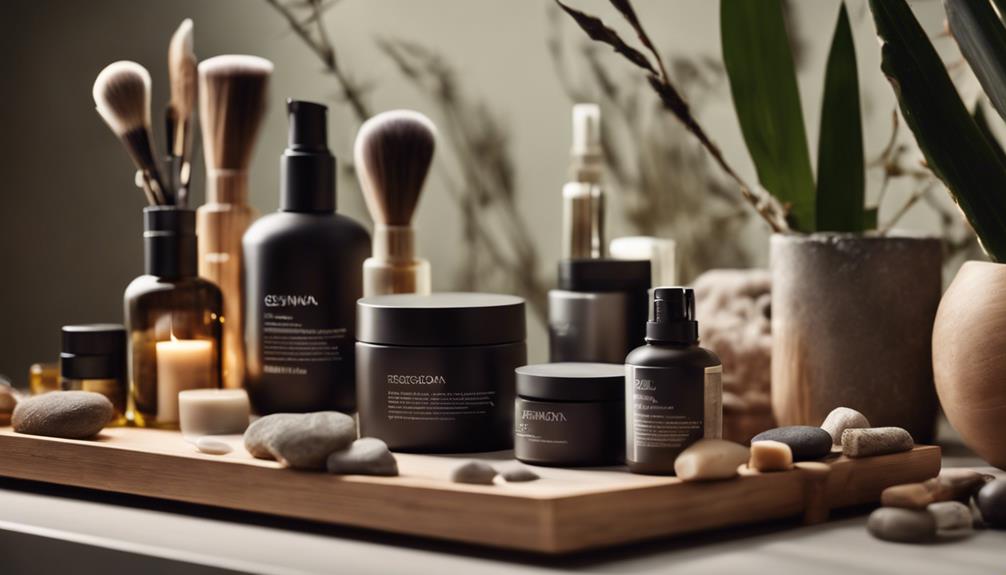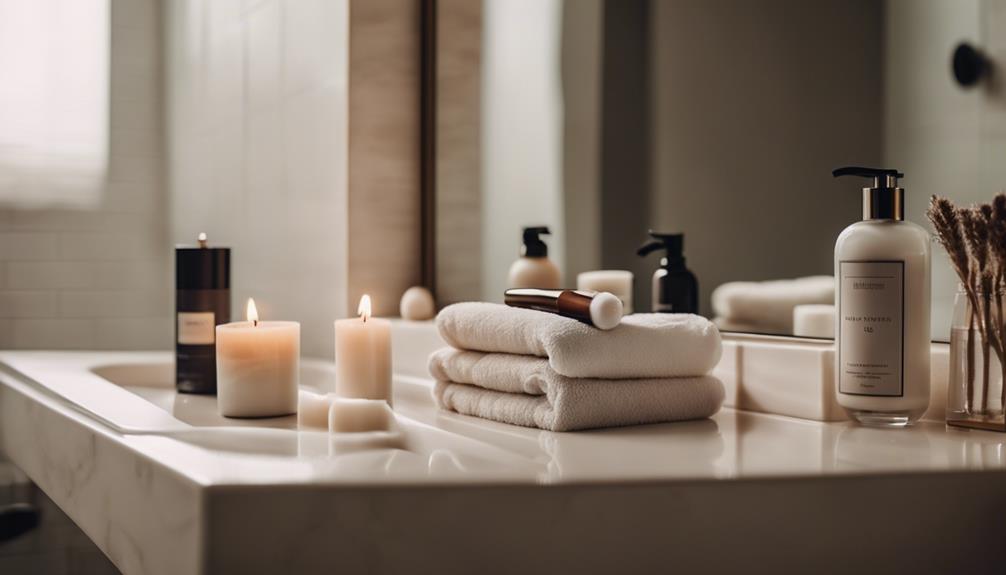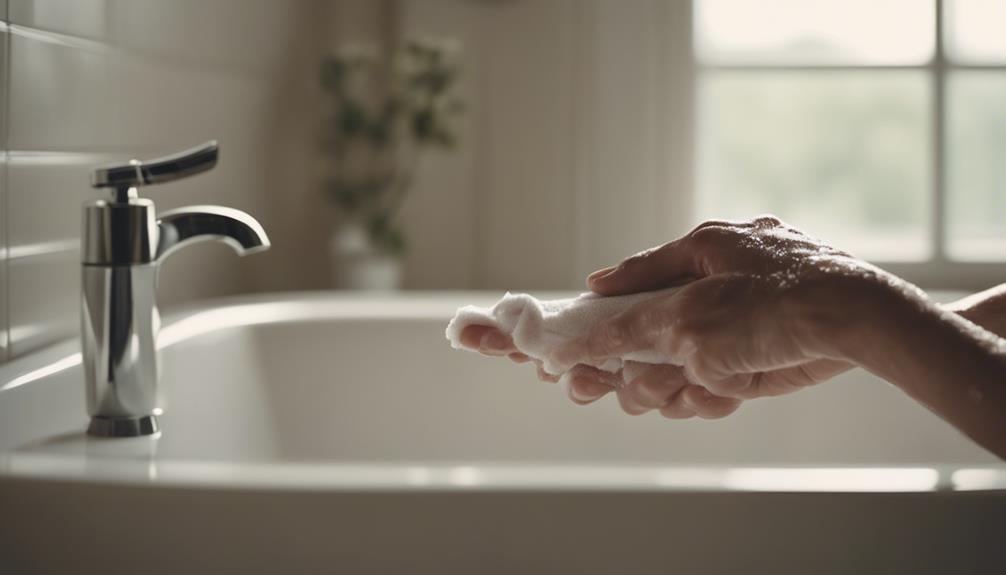To combat oily skin, start with a solid skincare routine. Cleanse your face twice daily with a gentle foaming cleanser, focusing on oily areas like your nose and hairline. Use lightweight, oil-free moisturizers to keep your skin hydrated without clogging pores. Maintain a balanced diet and drink plenty of water to help manage oil production. Don't forget to stay active and get enough sleep, as both boost your skin's health. If you want to explore professional treatments or more in-depth tips, there's plenty more to discover on this topic.
Key Takeaways
- Cleanse your face twice daily using a gentle foaming or glycerine-based cleanser to effectively remove excess oil.
- Opt for lightweight, oil-free moisturizers to hydrate without clogging pores, and apply them on damp skin for better absorption.
- Maintain a healthy diet rich in fruits, vegetables, and whole grains while limiting sugar and dairy to help control oil production.
- Stay hydrated by drinking plenty of water throughout the day, which supports skin health and balances oil levels.
Understanding Oily Skin
Understanding oily skin begins with recognizing that it's primarily caused by overactive sebaceous glands influenced by genetics and hormonal changes. If you find yourself dealing with oily skin, you're not alone—many people experience this condition, especially during adolescence and young adulthood. Your skin produces excess sebum, which can lead to common concerns like acne, enlarged pores, and that unwanted shiny complexion.
To tackle these issues, a solid skin care routine is vital. Focus on daily cleansing to keep oil levels in check. Gentle foaming cleansers work wonders, helping remove excess sebum without stripping your skin of necessary moisture. Incorporating toners with salicylic acid can further assist in minimizing pores and controlling oil production.
Regular exfoliation, about once or twice a week, is essential. It helps remove dead skin cells that can clog pores, exacerbating oiliness and increasing the risk of breakouts.
Don't underestimate the impact of a balanced diet, adequate hydration, and healthy lifestyle choices, like exercise and sufficient sleep. All these factors play a significant role in managing oily skin and promoting overall skin health.
Effective Cleansing Techniques

To manage oily skin effectively, adopting the right cleansing techniques is key to keeping excess oil at bay. Start by cleansing your face twice daily with a gentle foaming or glycerine-based cleanser. This helps remove excess oil without stripping your skin of its natural moisture.
For enhanced oil control, consider incorporating a deep-clearing clay cleanser or one that contains salicylic acid. Salicylic acid is excellent for dissolving dead skin cells and absorbing grease from your pores.
When cleansing, avoid hot water, as it can trigger your skin to produce even more oil. Instead, stick to lukewarm water for a balanced approach. After exercising, you might want to try double cleansing. Begin with an oil-based cleanser to break down sweat and oil, followed by a water-based cleanser for a thorough clean.
Pay special attention to areas prone to oil accumulation, like your hairline and around your nose. By focusing on these zones, you'll guarantee a thorough cleanse that effectively tackles oily skin.
With these techniques, you'll find it easier to maintain a fresh and shine-free complexion.
Essential Moisturizing Strategies

Finding the right moisturizer is essential for keeping oily skin hydrated without causing breakouts. To achieve this, opt for lightweight, oil-free moisturizers that won't clog your pores. These products help maintain balanced moisture levels and prevent excess oil production. Always apply your moisturizer on damp skin; this enhances absorption and allows hydration to penetrate deeply.
When choosing a moisturizer, look for those labeled as 'non-comedogenic' to guarantee they won't contribute to acne. Incorporate hydrating ingredients like hyaluronic acid or glycerin to attract moisture without adding extra oil. If you're using retinol or other active treatments, select a moisturizer that offers sufficient hydration to combat irritation.
Here's a quick overview of the essential components to take into account:
| Moisturizer Type | Key Ingredients | Benefits |
|---|---|---|
| Oil-Free | Hyaluronic Acid | Deep hydration without oil |
| Lightweight Gel | Glycerin | Attracts moisture |
| Non-Comedogenic | Aloe Vera | Soothes and prevents breakouts |
Lifestyle Adjustments for Oily Skin

Making some lifestyle adjustments can greatly impact how oily your skin feels and looks. By focusing on diet, hydration, and stress management, you can take control of excess oil production and improve your skin's condition.
Here are some effective changes to reflect upon:
- Eat a balanced diet: Incorporate plenty of fruits, vegetables, and whole grains while limiting sugar and dairy.
- Stay hydrated: Drink plenty of water throughout the day to maintain skin elasticity and overall health.
- Exercise regularly: Engage in physical activity to help balance hormones and improve your complexion.
- Prioritize sleep: Aim for 7-9 hours of quality sleep each night to lower stress levels that can trigger oiliness.
Professional Treatment Options

Professional treatment options offer effective solutions for managing oily skin and achieving a clearer complexion.
One popular choice is chemical peels, which can greatly reduce oiliness and clear clogged pores, enhancing your skin's texture and tone.
If you're dealing with persistent oil production, laser therapy might be the answer. This treatment specifically targets overactive oil glands, helping to minimize acne and prevent future breakouts. Keep in mind that you may need multiple sessions for the best results.
Regular facials designed for oily skin are another excellent option. These sessions utilize deep cleansing techniques and exfoliation to remove excess oil and impurities, promoting a clearer complexion.
If you have severe oily skin or acne, dermatologists often prescribe topical treatments like retinoids or benzoyl peroxide. These treatments can enhance skin cell turnover and effectively reduce oil production.
For the most persistent cases, isotretinoin may be recommended under medical supervision. This powerful medication provides a long-term solution by greatly reducing sebaceous gland activity, leading to less oiliness and clearer skin.
Consider discussing these professional treatments with a dermatologist to find the best approach for your skin type.
Frequently Asked Questions
How to Combat Oily Skin for Men?
To combat oily skin, you should cleanse twice daily with a gentle foaming cleanser, use a toner with salicylic acid, apply lightweight moisturizers, exfoliate weekly, and always wear broad-spectrum sunscreen to protect your skin.
What Is the Best Skin Care for Oily Skin for Men?
If you don't want your face to resemble an oil slick, you need a killer skincare routine! Start with gentle cleansers, oil-free moisturizers, and sunscreen daily. Trust me; your skin will thank you!
Does Oily Skin Mean High Testosterone?
Oily skin doesn't always mean you've got high testosterone. While elevated levels can increase oil production, genetics, hormones, and lifestyle factors also play roles. It's crucial to evaluate all influences on your skin's condition.
How Do I Stop My Skin From Being Oily Asap?
If your skin's been overly generous with its natural glow, try washing your face twice daily with a gentle cleanser, using a toner, and applying an oil-free moisturizer to balance things out quickly.
Are the Tips for Combatting Oily Skin Also Effective in Treating and Preventing Acne for Men?
Yes, the tips for combatting oily skin are also effective in treating men’s acne prevention. Men can benefit from using oil-free products, maintaining a regular skincare routine, and avoiding harsh exfoliants. Additionally, keeping the skin clean and using non-comedogenic products can help prevent acne in men.
Conclusion
To truly tackle your oily skin, remember these practical pointers: cleanse consistently, moisturize mindfully, and make mindful lifestyle choices.
By embracing these expert tips, you'll be well on your way to a clearer, more confident complexion.
Don't forget to contemplate professional treatments if needed.
With dedication and determination, you can defeat the shine and showcase your skin's natural charisma.
So, step forward and shine bright without the slick!









